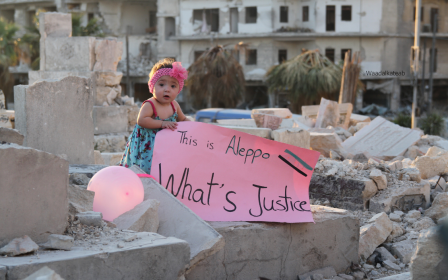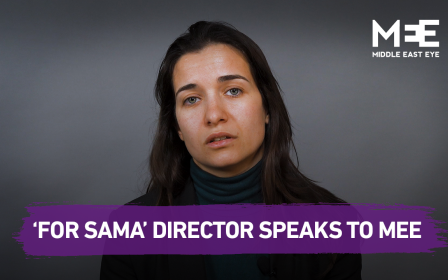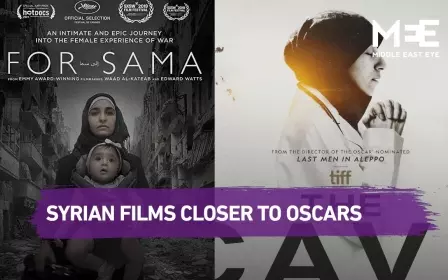Syrian war film wins as diversity debate dominates BAFTAs

Four years ago, Waad al-Kateab, her husband, Hamza, their newly born daughter, Sama, and their friend, Afraa, were in the basement of a bombed out hospital in Aleppo wondering if they would ever make it out alive to tell their story.
On Sunday, the four of them were on the stage at London’s Royal Albert Hall after Kateab's film For Sama won the best documentary prize at the British Academy of Film and Television Arts' (BAFTA) awards.
For Sama tells the story of Kateab, then a 25-year-old Syrian filmmaker and journalist, as she falls in love and gives birth all while documenting a revolution where death and destruction ravage her hometown of Aleppo.
The film became the most nominated documentary in BAFTA history, shortlisted across four categories. It won the award for best documentary, and was also nominated for outstanding British film, film not in the English language and outstanding debut.
In a powerful acceptance speech, Kateab dedicated the win to the “great Syrian people who are still suffering today” and urged those in attendance to “let them hear your voice”.
Stay informed with MEE's newsletters
Sign up to get the latest alerts, insights and analysis, starting with Turkey Unpacked
Speaking to Middle East Eye in October, Kateab said she framed the film around her daughter but the story it tells is a wider one. "It's all linked around Sama. Sama not just as my daughter, but as all of the children in Syria," she said.
Many social media users around the world, including British filmmaker Dawn O’Porter and Irish actor Chris O’Dowd, used the hashtags #ProtectKids and #ActionForSama to raise awareness about the plight of children caught up in war.
BAFTAs accused of ‘systemic racism’
Despite For Sama’s historic success, the BAFTAs were dominated by accusations of a lack of diversity among nominees.
In the acting categories, there were no nominations for any non-white actors in main or supporting roles - even though Scarlett Johansson and Margot Robbie managed two nominations each.
Best actor winner Joaquin Phoenix was widely praised for a blistering speech in which he called out “systemic racism” in the film industry.
"I think that we send a very clear message to people of colour that you're not welcome here,” Phoenix said.
“This is not a self-righteous condemnation because I'm ashamed to say that I'm part of the problem. I have not done everything in my power to ensure that the sets I was on are inclusive.”
Prince William, the president of BAFTA, shared his “frustration” at the lack of diversity, announcing that “a full and thorough review of the entire awards process” had been launched.
The awards were also heavily criticised for poor gender representation, with no women nominated for best director - for the seventh year in a row.
Comedic actor Rebel Wilson, who presented the top director prize, didn’t miss the opportunity to take a swipe.
“I don’t think I can do what they do,” she said. “Honestly, I just don’t have the balls."
Middle East Eye delivers independent and unrivalled coverage and analysis of the Middle East, North Africa and beyond. To learn more about republishing this content and the associated fees, please fill out this form. More about MEE can be found here.




